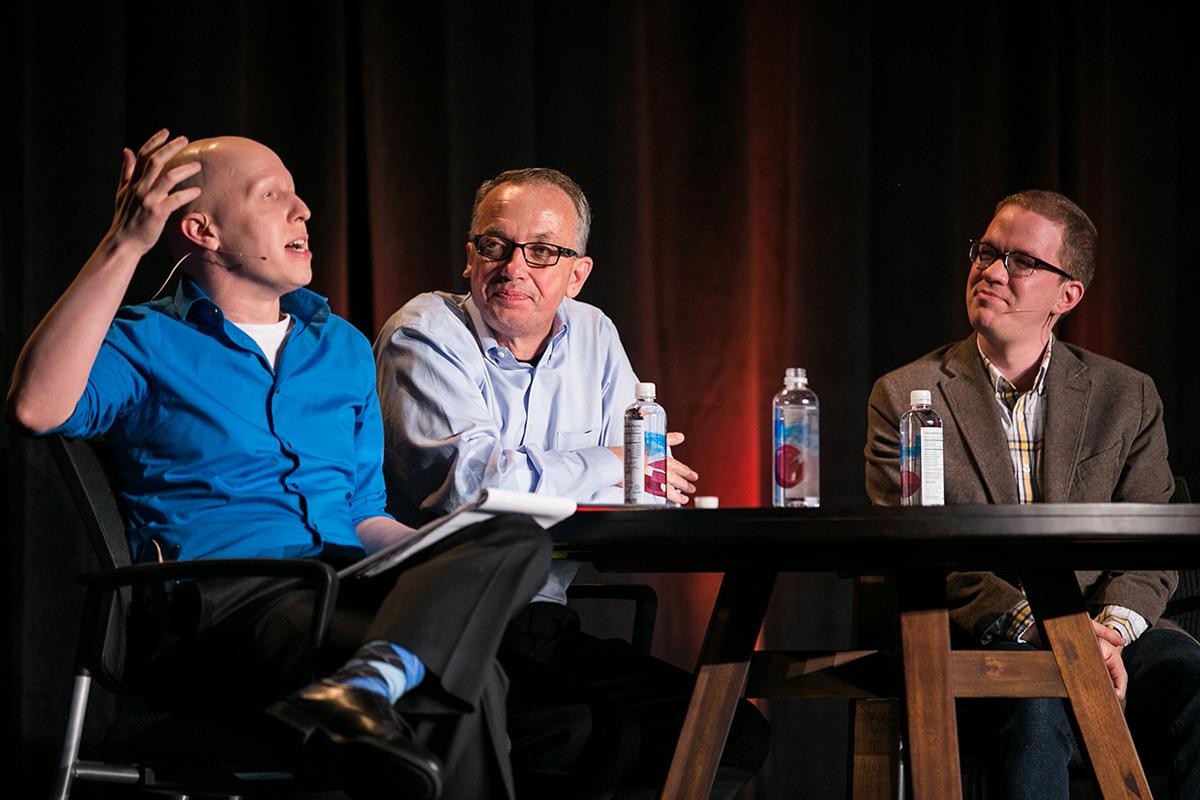
The “How Do We Love? A thoughtful dialogue on sexual differences” forum on Oct. 7 addressed the two main sides of the discussion regarding human sexuality within the Christian community. Students filled every seat in Sutherland Hall and the overflow seating in Calvary Chapel.
The discussion centered around Biola’s Biblical Position Paper on Same-Sex Behavior, which the university released during the week of Sept. 20, fulfilling a promise made last year.
Wesley Hill, assistant professor of New Testament at the Trinity School for Ministry and Justin Lee, executive director of the Gay Christian Network, discussed different approaches to same-sex relationships.
“It is possible to have healthy, compassionate, grace-filled dialogue on challenging scriptural issues like this in a way that both respects the importance of the questions and of our scriptural conclusions and deals with people as human beings in all those issues,” Lee said.
Lee, a proponent of the Side A argument, believes that God blesses same-sex marriage. Hill advocates for Side B and believes God calls homosexual Christians to lifelong celibacy. The discussion exposed students and faculty to different perspectives and engaged them in a conversation on sexuality.
HILL AND LEE DISCUSS BIOLA'S STATEMENT
Hill offered ways for the paper to improve on its approach and agreed with the conclusion of the paper as marriage being God-designed for males and females. One of his suggestions was that the paper should include that fact that all desire has been disordered by the fall, creating a need for order in all desire — heterosexual and homosexual alike.
“There needs to be more reflection on how heterosexual desire needs to be reordered,” Hill said.
Hill called for a discussion on the topic of homosexuality that was based in God’s overall plan.
“It’s too easy to kind of throw verses at each other taken out of context and I think the paper is asking us to read scripture in light of what God has done in Jesus and I hope that’s what people take away,” Hill said.
Lee said homosexuality discussions should stop focusing on sex and start focusing on relationships, as well as the story of each individual. He expressed his frustration with Bible verses being taken out of context and pushed on homosexual Christians.
“We must interpret them in the context of real peoples’ lives — not in the abstract or in a vacuum,” Lee said.
Lee said his friendship with Hill allows him to approach the conversation from a perspective of eager engagement rather than focusing on having the correct viewpoint.
“You know, Wes and I are good friends and even though we disagree, I like that we can have a conversation that doesn’t feel like an argument. So, if we’ve been able to demonstrate gracious dialogue, then I’m happy,” Lee said.
STUDENTS DEEM FORUM SUCCESSFUL
Students said they were grateful to Biola for hosting the “How Do We Love?” event. Joseph Olvera, junior international business major, said he wished he invited more people to the event to hear Lee and Hill talk about the relational aspect of homosexuality and how students need to engage further with gay Christians on campus.
“It can certainly feel scary for those who don’t feel welcome,” Olvera said. “We need to give a welcoming spirit and be Christ-like and share our community with each other. We can’t just lock them out.”
Sophomore psychology major Bailey Acosta co-leads NakID Ministries, a Christian organization run by students that meets bi-weekly to discuss topics regarding homosexuality. She took notes during the discussion and feels better prepared as a leader to meet and understand individuals with contrasting views on homosexuality, Acosta said.
“I think it was a wonderful foundation for Biola students to be able to start having more conversations and learning how to better love the LGBT community inside Christianity,” Acosta said.
Anna Kietzman, senior music composition major, wanted Lee and Hill to further discuss how Biola students could further engage with one another in conversations about homosexuality, Kietzman said.
“I wish that they had talked more about how to engage the people on our campus in a healthy way that isn’t minimizing. All you might need to do is pray for that person and to love them for who they are, as they are,” Kietzman said.







